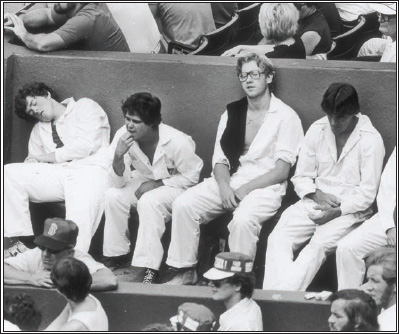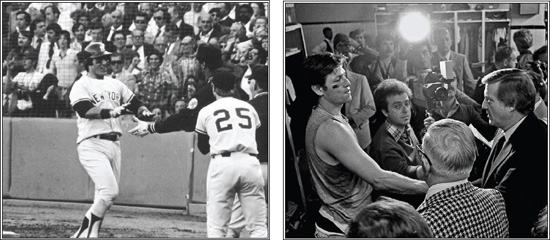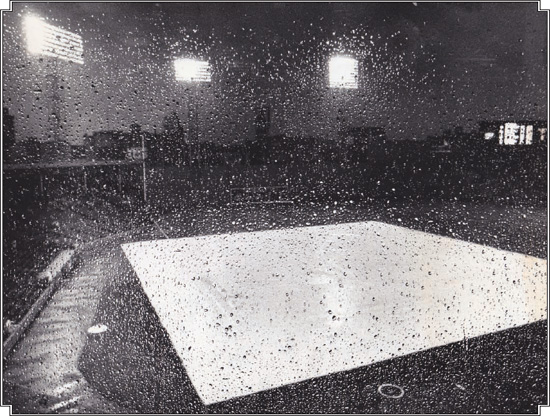Fenway Park (40 page)
Authors: John Powers
By autumn, Johnson had been fired, Yawkey had died, a blockbuster deal with Oakland had been voided and the Sox, who never spent a day in first place, had to make a magnificent closing surge just to finish third as they posted their fewest number of victories (83) in a decade. Ten straight losses, half of them at Fenway, buried the club in sixth place and it never recovered.
The troubles in the ’76 season began early. Eight days after a brawl-filled May meeting in the Bronx that put Lee on the sidelines for two months with a torn shoulder ligament, the Sox met the Yankees at the Fens, where extra security was added in case the fans sought retribution. Though Boston dropped two of three and sank to fourth, prospects seemed markedly brighter when O’Connell made a bold deal with the cash-strapped Finley, buying A’s pitcher Rollie Fingers and first baseman/outfielder Joe Rudi for $1 million apiece.
“We had to make up our minds that we’re trying to win the pennant this year,” said the general manager. The deal, though, seemed too good to be true, and it was. Commissioner Bowie Kuhn soon nixed the sale “in the best interests of baseball.”
“Bowie Kuhn is acting like the village idiot,” fumed Finley, whose sale of Vida Blue for $1.5 million to the Yankees also was voided.
Three weeks later Yawkey, who’d had no problem opening his pocketbook if it would have meant another pennant, died at 73 after battling leukemia for several years, ending an era both in Boston and in baseball. “He gave so much to this city,” said Mayor Kevin White. “Over the years so much pleasure. Last year so much excitement. And always so much class.”

The Fenway grounds crew caught a few Zs in July 1978.
“I love Fenway. I love it in spite of the things about it that I hate.”
—Stephen King, author
The Sox soon went into free fall, losing 11 of 13 games on the road to drop to fifth. That meant the end for Johnson, who’d been Manager of the Year in 1975, but couldn’t find a way to keep his club in contention in 1976. “What happened? I just ran out of answers,” he said. It was easier, O’Connell conceded, to change the manager than the team, “which would be practically impossible.”
So Don Zimmer, the Sox third-base coach who’d previously managed the Padres for two years, took over as skipper and the club caught fire as summer turned into fall, winning 15 of their final 18. “Third place is no big thing,” Zimmer acknowledged, “but it was an outstanding finish.”
Except for signing Twins reliever Bill Campbell to a seven-figure deal, the front office opted not to shop in what it deemed an overpriced bazaar during the first year of MLB free agency, instead bringing back George Scott and Bernie Carbo from the Brewers for Cecil Cooper. That created a cadre of wallbangers that rivaled the 1927 Yankees for percussive power.
The 1977 club set franchise records for homers, hitting 124 at home and 213 in all, with Rice contributing 39, Scott 33, Hobson 30, Yastrzemski 28, and Fisk 26. Its most jawdropping—and delightful—display came on a mid-June weekend in Fenway when Boston cranked 16 round-trippers off the Yankees amid a three-game sweep in which the hosts outscored their archrivals by a combined 30-9 on national television.
The shelling began immediately as the Sox battered Cat-fish Hunter for four homers in the first inning of the opener, and then added two more in a 9-4 bashing. “They beat the hell out of us tonight,” acknowledged New York’s Reggie Jackson. “They were sending bombs everywhere.” Unfortunately, the triumph was marred by bleacher oafs who pelted New York center fielder Mickey Rivers with metal bolts. “If it happens again, I’m going to pull my team off the field,” vowed Yankees Manager Billy Martin. “We won’t stand for that kind of stuff. Somebody could get killed.”
The Sox were doing enough damage to the visitors with horsehide, thumping another five homers (with two apiece from Carbo and Yastrzemski) in a 10-4 drubbing on Saturday that was equally notable for a dugout confrontation between Martin and one of his star players, Jackson, who chafed at being pulled from the game because the skipper thought he’d loafed on a fly ball.
The Yankees left the Fens both squabbling and reeling after dropping the finale, 11-1, on Sunday in a game highlighted by another five Boston homers. “We just had our men playing in the wrong spots,” observed Martin, whose own club didn’t manage a single shot. “We should have stationed them in the screen.”
It was the most rewarding home stand in memory for the Red Sox, who went 9-1 and vaulted from third to first place. Nobody who’d witnessed the humbling of New York would have bet that the Yankees would come back to win the division or that the Sox soon would turn into a white-knuckle carnival ride. They lost nine in a row, and then won seven of eight. During a West Coast road trip in late July and early August, they won nine straight as part of a 16-1 surge, and then lost seven straight to fall into second place.
Despite winning 11 of 13 to start September, Boston never again was atop the pile and the season ended with an ironic twist as the Sox gave up six homers to the Orioles in an 8-7 loss that eliminated them and let the Yankees spray champagne. “Just like the horses I bet on, I came up a little short,” Zimmer joked in a telegram to Martin. “Congratulations.”
While the Yankees went on to beat the Dodgers to win the World Series for the first time since 1962, the Sox were left to ponder yet another near miss. “You start out in April and you hope to be in a pennant race when it ends,” mused Yastrzemski, after Boston had finished in a second-place tie with Baltimore. “We were in this one until the end and I have no regrets. The better team won.”
In 1978, the Sox were in the race to the end and beyond, and the payoff was the most painful October moment in three decades. There had been significant changes before the club reconvened in Florida with the Yawkey Trust shifting control of the franchise to widow Jean, former vice president and catcher Haywood Sullivan, and former trainer Buddy LeRoux. After dismissing O’Connell, management reshaped the roster, shipping out Jim Willoughby, Ferguson Jenkins and, eventually, Wise and Carbo—the bulk of the bohemian “Buffalo Heads” clique that Zimmer abhorred—and bringing in Mike Torrez and fellow pitchers Dennis Eckersley (who won 20 games), Dick Drago, and Tom Burgmeier.

GAME NO. 163
After 162 games, there was only one way to settle one of the most tumultuous playoff races in baseball history: with Game No. 163. One of the two teams—the Yankees or the Red Sox—would reach the 100-victory mark and move on to the 1978 American League Championship Series vs. the Kansas City Royals. The other would have a litany of questions to answer about a final duel that would define this six-month roller-coaster ride of a season.
That 1978 AL East battle is remembered mostly for a Red Sox collapse. What many forget is that the Red Sox actually rallied to post a 12-2 record in their last 14 games, winning their final eight, to catch New York on the season’s final day and set up the one-game playoff at Fenway.
Boston was sailing along with a 2-0 lead in the seventh inning when light-hitting Yankee shortstop Bucky Dent (who had a batting average of .140 over the previous 20 games) sent a fly ball into the screen off Mike Torrez with two men on, deflating Sox fans and surprising Dent himself, who didn’t think his hit would clear the wall. (“I couldn’t believe it,” he later admitted.) New York extended its lead to 5-2, and just as they had played it out over the long season, the Sox would be forced to rally from behind in the late going.
The collective will of more than 35,000 Sox fans, along with a couple of timely hits, brought Boston back to within 5-4, and Carl Yastrzemski, who had homered earlier in the game when the day held such promise, stepped in with two outs in the last of the ninth and Rick Burleson on third base representing the tying run. Yaz managed only a towering pop fly off the Yankees’ flamethrower Rich Gossage, and the most agonizing season in Red Sox annals was complete.
After 163 games over more than six months, the Sox had come up shy by one base, the distance between third and home plate. They had won 99 games, fourth-most in their history, but finished second to the Yankees’ 100 victories. New York would go on to win its second straight world title. “We have everything in the world to be proud of,” said Yaz afterward, “what we don’t have is the ring.”

Teammates welcomed Bucky Dent after his three-run homer in the seventh inning gave the Yankees the lead in the 1978 one-game playoff. Afterward, Yankees’ owner George Steinbrenner (right) consoled Red Sox catcher Carlton Fisk.

It was just another rainy June evening at Fenway Park in 1977.
The result was an explosive start (45-19, 28-4 at home) that astounded even the most pessimistic Sox fans and had Boston in first place by seven games on June 17. At the All-Star break, the Sox led Milwaukee by nine games, with New York a distant 11½ astern. But in the wake of a spate of injuries, the pitching, hitting, and defense all collapsed, and the Sox began drooping by late summer.
By the time Boston met its traditional tormentors, the Yankees, at Fenway in September, New York had replaced Billy Martin with the less acerbic Bob Lemon, healed their internal divisions and closed to within four games. By the time New York left town, the Yankees had drawn even with a four-game sweep so devastating that it was labeled “The Boston Massacre.” The visitors, who’d won 12 of their previous 14 outings, teed off on Torrez, who’d won two Series games for them the previous year, and administered a 15-3 flogging that was so unsightly that thousands of fans fled early. “Maybe we tired (the Yankees) out,” Zimmer said, wryly. “They had scheduled extra hitting Friday afternoon. They called in the fifth inning and canceled it.”